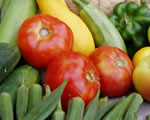 Go to main content
Go to main content
Archive Website of the UK government
Please note that this website has a UK government accesskeys system.
Main menu
Page menu
Environment and greener living

Grow your own fruit and vegetables

Growing your own food can be good exercise and could save you money. It can also give you a healthy supply of fresh, seasonal fruit and vegetables. There are lots of places you can grow plants, even if you don't have a garden. Discover the different options and get started.
Why grow your own?
Learn about food
Growing fruit and vegetables can help children learn about where food comes from.
More people are getting interested in growing their own fruit and vegetables, for many different reasons:
- it could save you money on expensive items like salad leaves
- gardening is a cheap form of exercise and a great way to burn calories and get some fresh air
- it helps children understand where food comes from, and could encourage more interest in eating fresh fruit and vegetables in season
- growing your own can help you get your five-a-day portions of fruit and vegetables
- you'll become more aware of what's in season, so you may find it easier to choose seasonal food when you go shopping (seasonal food is likely to need less energy to produce)
- gardening can be a sociable activity which involves you in your local community
- it can help to reduce stress and can give you a sense of achievement
Growing plants at home
You may only have a small balcony, or a space on the window ledge, but it needn't stop you taking your first steps at gardening. You can grow herbs indoors or salad leaves outside in a pot. If you have a garden but no space for a dedicated food plot, you can try planting fruit or vegetables amongst your flowers.
You could ask a neighbour with a large garden if you could cultivate a patch of ground. In return you could offer some of your produce.
Growing on a larger scale
Perhaps you don't have a space at home or want to grow a larger amount of crops. If so, you can search for local community gardening schemes, think about renting an allotment or use the Landshare website.
Landshare
Landshare matches spare land with people who want to grow their own fruit and vegetables. If you want somewhere to grow produce, or have land you wish to share, the Landshare website will help. You can advertise spare land, or look for extra growing space.
Renting an allotment
Your local council will have details of the allotments near you with spaces. Allotments have become so popular that there is often a waiting list and it may be a few months or even years before one becomes available.
If you want advice on asking your council to provide more allotments, visit the National Society of Allotment and Leisure Gardeners (NSALG) website. The NSALG can give you information on the laws about providing allotment spaces.
The Allotments Regeneration Initiative provides advice on developing and creating new allotment sites, and mentoring for groups wishing to set up allotments of any size.
In recent years the National Trust has created 1,000 allotment spaces on their land, where people can grow their own crops. See the National Trust website for more details of this scheme.
Get involved with your local community
There are many ways you can get involved in your local community.
Community projects
There are many community grow your own projects you can get involved in. Some are organised by groups like the British Trust for Conservation Volunteers (BTCV), and some are projects created by communities themselves. Find out more about green volunteering projects in your area on the Muck In4Life website.
In several places around the UK, new 'transition towns' have been formed to create a more sustainable way of living, and have a lower carbon footprint than other towns. Many of these transition towns have started food growing as part of this.
You can find out more information about transition towns, and get advice on how to set up your own, from the transition towns website.
Community garden schemes
Community garden schemes are available in many areas of the country. Groups of people have joined together to reclaim land to grow food and plants as a neighbourhood community project. The projects provide a space for people to enjoy and learn about gardening, share tools, seeds and produce, and meet other people.
Look on the Federation of City Farms and Community Gardens website for a list of community gardens and farms in the UK.
In London, the Capital Growth programme is making more food growing space available to the public through community and voluntary schemes. Visit the London Development Agency (LDA) website for more information.
What to grow and when
There is plenty of advice available on growing your own fruit and vegetables, including organic produce, from various sources:
- Royal Horticultural Society (RHS) - information on growing and using fresh produce
- BBC gardening - advice on what to grow, where and when
- Eat seasonably - simple instructions on how to grow ten easy fruit and vegetables
- Organic gardening - ways to grow fruit and veg without chemicals and pesticides
Useful contacts
In this section...
- Water: using less in the garden
- Controlling pests and weeds: greener choices
- Barbecues and outdoor heaters: greener choices
- Sheds, greenhouses and garden furniture: greener choices
- Choosing peat-free soils and fertilisers
- Encouraging wildlife in your garden
- Composting
- Greener gardening: a quick guide
 Facebook
Facebook Twitter
Twitter StumbleUpon
StumbleUpon Delicious
Delicious Reddit
Reddit
